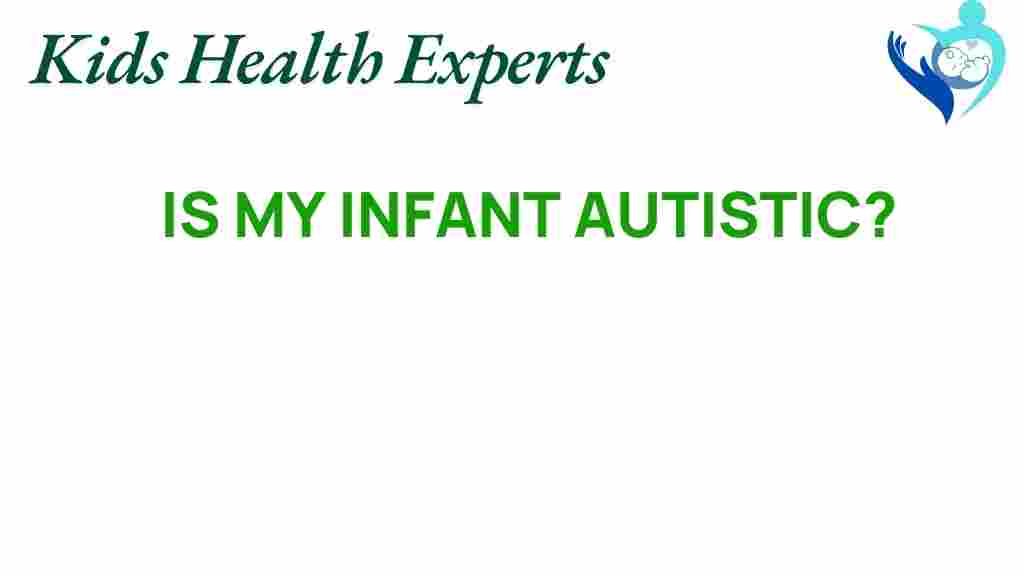Unraveling the Mystery: Is My Infant Autistic?
As parents, it’s natural to be concerned about your infant’s development. Key milestones in infant development can often raise questions, especially when it comes to conditions like autism and autism spectrum disorder (ASD). Recognizing the early signs of autism can be crucial for timely intervention and support. In this article, we’ll explore the early signs of autism, parental concerns, and the importance of early diagnosis and intervention.
Understanding Autism and Infant Development
Autism is a developmental disorder that affects communication, behavior, and social interaction. The symptoms can vary widely and can sometimes be subtle in infants. Understanding the milestones of infant development is essential for parents to identify any potential concerns early on.
Early Signs of Autism
Identifying the early signs of autism can be challenging, as infants develop at different rates. However, certain behaviors may indicate the need for further evaluation. Here are some early signs to look out for:
- Limited Eye Contact: Infants may not make direct eye contact or may seem disinterested in looking at faces.
- Lack of Response to Name: By six months, infants typically respond to their name. A lack of this response may be a sign of autism.
- Delayed Social Smiling: Infants usually start smiling socially by around two months. Delays in this behavior could be concerning.
- Reduced Gestures: Failing to point, wave, or use other gestures to communicate by 12 months may indicate developmental issues.
- Unusual Repetitive Behaviors: Infants showing repetitive movements, such as rocking or hand flapping, may warrant further observation.
Common Parental Concerns
As a parent, you might have several concerns regarding your child’s behavior and development. Here are some common worries:
- Is my child meeting their developmental milestones?
- Are their social interactions typical for their age?
- How does this behavior compare with other children?
- What steps should I take if I suspect autism?
It’s important to remember that every child develops at their own pace. However, if you notice several early signs of autism, seeking professional guidance can provide peace of mind and necessary support.
Diagnosis of Autism Spectrum Disorder
Diagnosing autism spectrum disorder can be complex. The process often involves multiple evaluations by healthcare professionals, including pediatricians, psychologists, and speech-language pathologists. Here’s a step-by-step guide to the diagnosis process:
1. Developmental Screening
During routine check-ups, your pediatrician will likely conduct developmental screenings to assess your child’s growth in key areas like communication, motor skills, and social interaction. This is often done using standardized questionnaires.
2. Comprehensive Diagnostic Evaluation
If concerns arise from the initial screening, a comprehensive evaluation may follow. This includes:
- Detailed interviews with parents regarding the child’s behavior and development.
- Observations of the child in various settings.
- Assessment tools like the Autism Diagnostic Observation Schedule (ADOS).
3. Multidisciplinary Team Review
Often, a team of specialists will collaborate to interpret the evaluation results. The input from various professionals is crucial for an accurate diagnosis.
The Importance of Early Intervention
Early intervention can significantly improve outcomes for children with autism. Here’s why it matters:
- Enhanced Development: Early intervention can help children develop essential skills in communication, socialization, and learning.
- Better Long-term Outcomes: Studies show that early support can lead to improved academic performance and social skills.
- Family Support: Early intervention programs often include support for families, helping them understand and manage their child’s needs.
Steps for Parents to Take
If you’re concerned about your infant’s development, here are steps you can take:
1. Observe and Document
Keep a record of any concerning behaviors or delays. Note when they occur and any patterns you observe. This documentation will be helpful during discussions with healthcare professionals.
2. Talk to Your Pediatrician
Schedule an appointment with your pediatrician to discuss your concerns. They can provide guidance on screenings and evaluations.
3. Seek Specialist Evaluation
If recommended, pursue an evaluation from a specialist in child psychology or developmental disorders. Early diagnosis and intervention are key.
4. Get Involved in Early Intervention Programs
Many communities offer early intervention programs that can provide support and resources for your child. Look for local services that specialize in autism.
Troubleshooting Tips for Parents
As you navigate your concerns about your infant’s development, here are some troubleshooting tips to consider:
- Stay Informed: Educate yourself about autism and child development. Knowledge can empower you to advocate for your child.
- Connect with Support Groups: Joining parent support groups can provide emotional support and practical advice from others facing similar challenges.
- Be Proactive: If you suspect your child may be on the autism spectrum, don’t hesitate to seek help. The sooner you act, the better.
- Maintain Open Communication: Keep an open dialogue with your child’s caregivers and educators. Consistent communication can ensure everyone is on the same page regarding your child’s development.
Conclusion
Recognizing the early signs of autism in your infant can be a daunting task. However, understanding infant development, being aware of parental concerns, and knowing the steps for diagnosis can empower you as a parent. Remember, early intervention can make a significant difference in your child’s life. If you have concerns about your infant’s development, don’t hesitate to reach out to healthcare professionals for guidance.
For more resources on autism and early intervention, you can visit the CDC’s Autism Spectrum Disorder page. Additionally, for support from other parents, check out local community groups or online forums.
By staying informed and proactive, you can help ensure that your child receives the best possible support and care as they grow.
This article is in the category Conditions and created by KidsHealthExperts Team

1 thought on “Unraveling the Mystery: Is My Infant Autistic?”